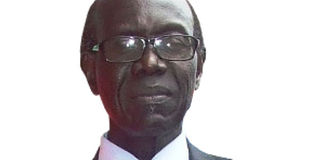UN ambassador’s job is not for the faint-hearted

Harold Acemah
As Ugandans were marking the 56th anniversary of independence, US ambassador to the United Nations, Ms Nikki Haley, tendered her resignation to US president Donald Trump.
At a meeting held on October 9 at the White House, president Trump accepted the ambassador’s resignation, effective from end of 2018 and heaped praises on the former governor of South Carolina State calling her “a hidden genius”.
Ms Haley, who was appointed to that prestigious position barely two years ago, provided no details, but one can always speculate.
The resignation brought to mind the trials and tribulations of diplomats, especially political appointees, who occupy what outwardly appear to be enviable and well-paid jobs.
The US ambassador to the UN is a Cabinet rank position. Jean Kirkpatrick was, I believe, the first woman to occupy the position of US ambassador to the UN. The offices of the US Mission to the UN are physically located next door to the offices of the Permanent Mission of Uganda to the UN, a stone’s throw from UN headquarters.
The foundation stone of the Uganda Mission to the UN was laid by Gen Idi Amin in 1975 and the building was fully funded by the government of Uganda during the coffee boom of the 1970s.
Challenges of diplomats at the UN
For a career diplomat, posting to United Nations headquarters is best after one has learned the ABC of diplomacy and gained sufficient experience at a bilateral station and at the Ministry of Foreign Affairs headquarters.
Most countries who take diplomacy seriously post their best career diplomats to represent them in New York which is primarily a centre for multilateral diplomacy, but to a lesser extent a centre for bilateral diplomacy as well.
Whereas Uganda has about 40 resident embassies and high commissions located in a variety of countries, Uganda can conduct bilateral relations with virtually all countries of the world in New York because most of the 193 member states of the United Nations have diplomatic missions accredited to the UN headquarters.
Unlike Uganda, a permanent member of the UN Security Council, such as USA, is a member of virtually all UN councils, commissions and committees. The most demanding of these UN organisations is the Security Council.
I recall when Uganda was elected to the membership of the Security Council for a two-year term from 1981 to 1982, the workload was so heavy that as head of the International Organisations Department in Kampala, I attended several council sessions in addition to additional staff we sent to bolster the capacity of our UN mission led by Mr Olara Otunnu who performed extremely well.
Ambassadors and diplomats who cover the work of the Security Council are, like good medical doctors, literally on call seven days a week and 24 hours a day. The Security Council can be convened anytime, on any day, including Saturday and Sunday. It can be a thankless job.
There is a small café and bar located near the Council chamber which does brisk business at odd hours, depending on when the Security Council is in session.
From my experience, it is an assignment a career diplomat is trained and groomed to handle, but for a politician it is one hell of a job. Although she has political ambitions, I would not be surprised if Ms Haley decided to resign because she is mentally and physically exhausted. Sheer fatigue may have taken its toll. As she admitted, it’s a tough job which is not for the faint-hearted.
Career diplomats are better equipped and prepared to endure long hours and often sleepless nights listening to long speeches in the plenary and committees, some of which can be boring and repetitive.
As I have argued before, diplomacy is a profession and should be practised by career diplomats, just like doctors, engineers and teachers handle their professions. It is a pity that Uganda’s diplomatic service has become a dumping ground for failed politicians, a tribal enclave for relatives of big men in government and cronies of an increasingly unpopular and desperate regime.
The damage which most political appointees have done to Uganda’s Foreign Service and Uganda’s national interest is enormous and incalculable and will take many years to undo.
For God and my Country!
Mr Acemah is a political scientist and retired career diplomat.
[email protected]




